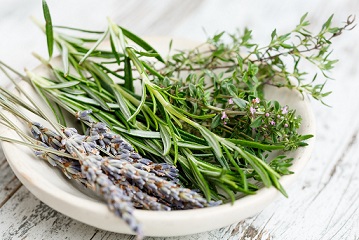Have so many thyme recipes but limited access to fresh thyme? Don’t worry as many people suffer from the same predicament! So, can you freeze thyme, how to do it, and how long does it last?
Yes, you can freeze thyme, and doing it the right way can ensure that it will last for anywhere between 6 and 12 months! Yes, you heard that right.
Always wondered what secrets thyme flowers hold? Read Are Thyme Flowers Edible? Appearance & Taste
Can Thyme Be frozen?
Yes, thyme can be frozen and stored for later use, whenever you may need it. Storing anywhere below its freezing point will help to preserve it and ensure it stays flavorful and palatable for a very long time even long after the day you froze it!
Just like freezing meat, all deterioration or microbial activity stops as the temperature at which freezers are set.
But, like other foods, it is not advisable to defrost your herbs before using them to cook a dish. The leaves are small and easily thaw during cooking.
Freezing thyme is easier than you think, plus, it has several benefits as well.
Benefits Of Freezing Thyme
While nothing may beat the effects of freshly cut thyme in a hearty home-cooked meal, not everyone has access to a live thyme plant. For this very reason, many people will consider freezing them as it is the next best option! Take a look at the benefits of freezing your thyme.
a) Convenience
Sometimes harvesting a chunk of thyme seems time-consuming if you are in a rush to cook a meal. Having it on hand saves a lot of time and prevents you from having to think about a substitute because you will always have frozen thyme on hand.
Not to mention that thyme frozen in oil or water cubes is more convenient than having to pick through a bunch of thyme, wash it, and then chop it up as well.
b) Long Lasting
Fresh thyme can only remain usable for up to a week while stored in your fridge. Not very efficient is it? But, when you consider freezing thyme, you can have access to thyme for months!
If you do it correctly, frozen thyme is capable of lasting a full 6 to 12 months!
Either way, frozen thyme will be much longer lasting than fresh or fridge-stored thyme.
c) Efficient
Frozen thyme is much more efficient than any other variant of thyme. It takes up less space and doesn’t need any further care and maintenance. It’s a one-time activity that requires just a few steps to prepare and freeze the thyme.
d) Offsets Disease and Spoilage
Very low temperatures or freezing temperatures are known to inhibit the growth and action of microorganisms. This helps to keep your thyme lasting longer and relatively tasty when you use it later on.
How to Freeze Thyme in Ice Cubes?
Wondering how everyone makes those interesting ice cubes that are filled with herbs of all kinds? Here are all the steps you need to try it at home.
#1. Pick Your Herbs
When you are planning to freeze and store thyme, you may also consider storing similar hardy herbs along with it. Other hardy herbs include Rosemary and Oregano, herbs that you may probably end up using in the same dish as thyme.
So, collect a sprig or two of each herb.
#2. Prepare Them
Immediately start to weed through the herbs and remove the bad bits. Wash the herbs thoroughly and pat dry with a paper towel. After this, you will want to proceed to chop your herbs to a size you are comfortable using
NOTE- You will be directly using these herbs without chopping them up again. You won’t be able to chop them once frozen.
Mix all the chopped herbs well to ensure an even distribution of all the herbs.
#3. Choose Between Oil & Water
You have two options to use as a filler for your ice cube trays and herbs. It can either be water or oil. The advantage of using oil is that it is useful in every meal and the oil will already be diffused with herb aroma and taste.
Water will freeze faster and is more likely to stay frozen for a long time. Water freezes at 0℉ (-17℃) while Oil freezes at 32℉ (0℃), meaning water is easier to freeze. But, adding these water and herb cubes could end up making your dish too watery!
You can choose which liquid to freeze your herbs in based on the dish you intend on making. Soups would benefit from water while meat dishes and marinades would benefit most from the oil.
#4. Fill The Ice Tray
Next, take a good amount of the chopped herb mix and place equal proportions in each cube. You will have to fill the cubes afterward with water or oil, whichever one you have chosen.
#5. Freezing
You can now take the ice tray and place it in a freezer where it is cold enough for the tray’s contents to completely freeze up. After some time you can pop out every individual herb-filled ice cube and store them in a packet.
You will want to do this since it may not be so easy to get a cube out when you are in a rush!
How To Freeze Thyme Sprigs?
While individual thyme leaves find use in soups and pasta. Sprigs are most useful for preparing meat marinades as well as decorating desserts.
Find out how to freeze whole thyme sprigs and keep them viable for long-term usage.
#1. Pick and Preparing Your Thyme
Start off by going to the garden and picking some of your very best thyme. Bring them and inspect for any bits that are already rotting or infected with the disease.
Give them a soaking which acts as a thorough wash. Now, lay them down on a paper towel to dry out.
NOTE- Excessive moisture, bacteria, and fungi can contribute to the spoilage of fresh herbs kept in the fridge or a freezer that is not cold enough!
#2. Storing
No need to take the thyme leaves off the stems. Freezing the sprigs whole acts as an economic approach and is the best option if you commonly use whole thyme sprigs for meat marination.
Simply take the washed and pat dried thyme sprigs and place them in a zip-lock bag or smaller air-tight container. Try to squeeze out as much air as possible as this can become a problem.
Adulterated air could also have bacteria or fungal spores which could contribute to faster spoilage of your frozen thyme sprigs. Furthermore, it could even lead to harmful effects for anyone consuming a dish made with that specific thyme.
#3. Freezing
This can then be kept in the freezer and taken out for use when you really need it the most. Just make sure to not leave the packet out of the freezer for too long. Also, try to zip the bag or close the container immediately after use.
How Long Does Frozen Thyme Last?
Naturally, any organic object will begin to show signs of deterioration after some time.
All plants are formed by glucose molecules bonded to create long cellulose chains. But, with time and elements, these break down further to their simplest form – the atoms; Carbon, Hydrogen, and Nitrogen.
If frozen correctly and stored at optimal temperatures without external interference, frozen thyme can last 6 to 9 months. Even 12 months in some cases!
However, the way you freeze your thyme matters. Whether you freeze it alone, in oil, or in water, a great difference will be visible in shelf life.
Conclusion
Thyme emits a great taste that anyone would appreciate. Although fresh thyme is the best option, the next best after that is frozen thyme.
You can freeze thyme in oil/water cubes or as whole sprigs. You can expect frozen thyme to last a good 6-12 months depending on certain conditions such as preparation, container, freezer temperature, and the quality of the thyme.
We are sure this blog will get you freezing thyme so that you can reap the benefits of its flavor year-round!
White Slugs in Your Garden – Pros and Cons
FAQs
How to thaw frozen thyme?
No need to thaw out frozen thyme as doing so would result in soggy and soft herbs. Instead, you are better off putting it in your dish while frozen to avoid loss of taste and composure. Throw it into the pot even if it is still in an ice cube!
Is thyme a tender or hardy herb?
Thyme is a hardy herb since its stem is relatively woody that only gets tougher and more woody as the plant matures and ages. This also means this herb needs a bit more time in the pot than other tender herbs. It does not make the best garnish and is instead great when used whole to impart massive amounts of flavor.

